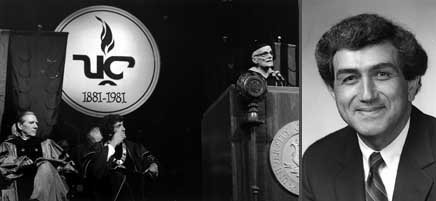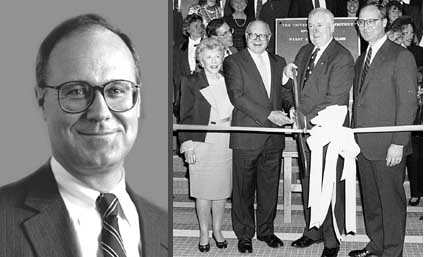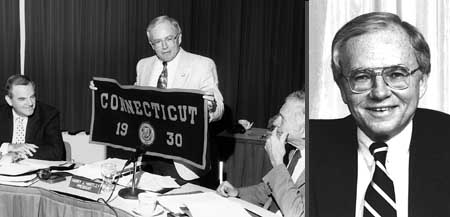|
This is an archived article.
For the latest news, go to the Advance
Homepage
For more archives, go to the Advance Archive/Search Page. |
||||||
|
Past Presidents To Attend Wilbur
Cross Dedication
By Mark J. Roy Related Articles: Building History | Wilbur Cross Biography The Wilbur Cross Building will be rededicated in a ceremony on Nov. 20, at 3:30 p.m. in the North Reading Room. Three former presidents of the University will attend the ceremony: John A. DiBiaggio (1979-1985) became UConn's 10th president in June 1979, after serving three years as vice president for health affairs and executive director of the Health Center in Farmington. During his tenure as president, the University adopted an academic master plan known as "Opportunities for the '80s"; mounted its first capital campaign, The Second Century Fund, which raised more than double its goal of $25 million; and first attained a degree of fiscal flexibility through creation of the Tuition Fund, which allowed the University to retain tuition payments.
A native of Michigan, he received his bachelor's degree from Eastern Michigan University, a dental degree from the University of Detroit, and a graduate degree in university administration from the University of Michigan. He left UConn in 1985 to become president of Michigan State University. In 1992, he moved to Tufts University as president, and led a $400 million capital campaign there. DiBiaggio retired from Tufts in 2001, becoming President Emeritus. John T. Casteen III (1985-1990) began his tenure as UConn's 11th president on Aug. 1, 1985, after serving for three years as Secretary of Education in Virginia. During his years in Storrs, the University revamped its telecommunications system through a $13.5 million project and saw construction of Gampel Pavilion, the United Technologies Engineering Building, an addition to the Pathobiology Building in Storrs, and an administrative building at the Health Center in Farmington. Also, the University's Development Office and the University of Connecticut Foundation were reorganized; the University's international programs were consolidated; and the Asian American Cultural Center was established.
Casteen became president of the University of Virginia in August 1990. He has overseen a major restructuring of the University of Virginia's administrative and governance structures; one of the largest capital fund campaigns ever undertaken; significant improvements in academic programs; and major expansions of the University's physical facilities. Harry J. Hartley (1990-1996), a native of Alaquippa, Pa., came to UConn in 1972 as dean of the School of Education. He served three times as vice president for finance and administration for three different University presidents. Hartley became UConn's 12th president in December 1990, after several months as interim president. During the Hartley years, the University attained greater flexibility in the management of its fiscal affairs; developed and adopted a strategic plan; celebrated "100 Years of Women at UConn" in 1991-92; commemorated "50 Years After Nuremberg: Human Rights and the Rule of Law" in 1995-96; saw the first sitting U.S. president to visit campus, when President Bill Clinton dedicated the Thomas J. Dodd Research Center in 1995; and successfully fought for UConn 2000, the $1 billion program to rebuild and renew the University's infrastructure.
Hartley returned to teaching after stepping down as president in 1996. This fall, he set a record for years of service by a UConn president, having surpassed Charles L. Beach's 30 years on the faculty and as president.
|



